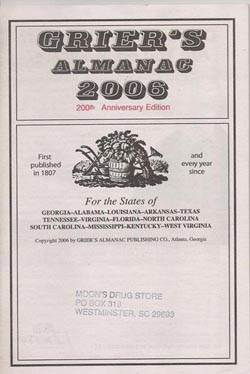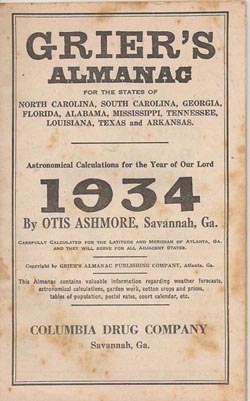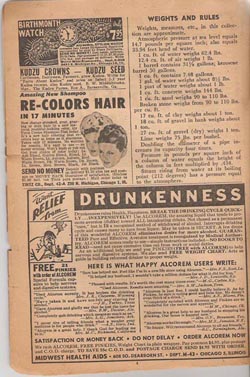















Southern Exposure
A Conversation with Gene McDonald
In a Christian music genre long noted for its bass singers, I have often heard old-timers comment that there will never be another one like so-and-so. While great bass singers such as Aycel Soward, Jim "Big Chief" Wetherington, Bill Lyles, J. D. Sumner, Brock Speer, George Younce and Rex Nelon remain inimitable, a number of talented vocalists today are meeting the high standards set by southern gospel's pioneering bass singers, and one of the most notable of these is Homeland Records' Gene McDonald.

Be sure to visit
www.GeneMcDonaldMusic.com!
www.GeneMcDonaldMusic.com!
Those Wonderful Ads!
Older issues of Grier's Almanac are desired by collectors because of the advertising. Within the pages of the 1934 issue (pictured below right), one can find ads for Bayer aspirin, Cheney's Expectorant (for coughs) and Feen-a-mint ("The Laxative That's Just Like Chewing Gum"). While these products were quite common and widely used at the time, a few other items were offered by more obscure companies, and following are just a few of the standouts:
Lots of Useful Stuff, Too
Besides a few hilarious ads and plenty of legitimate promotions, Grier's Almanac contains a helpful gardening calendar, zodiac information, a religious section, a chronological listing of memorable events and informing general interest articles.
Older issues of Grier's Almanac are desired by collectors because of the advertising. Within the pages of the 1934 issue (pictured below right), one can find ads for Bayer aspirin, Cheney's Expectorant (for coughs) and Feen-a-mint ("The Laxative That's Just Like Chewing Gum"). While these products were quite common and widely used at the time, a few other items were offered by more obscure companies, and following are just a few of the standouts:
- 6 6 6 a remedy for colds, headache, fever, biliousness, malaria and constipation available in liquid, tablets, nose drops and a salve! (Editor's note: I'd have to be pretty miserable before I would take something called "666.")
- Smith's Worm Oil, a product of the Galenol Company, Inc. of Atlanta. Described as "one of the oldest and most reliable worm medicines sold."
- Lydia E. Pinkham's Vegetable Compound, a "tonic and regulator" for "girls in their teens." The ad states, "Teach her how to guard her health at this critical time . . . When she is a happy, healthy wife and mother she will thank you."
- Securitee, a "renowned prescription in a jellied form" described as the "married woman's sure, safe method." "Are you financially able to take care of babies and give them the proper attention?," the ad asks. "If not it may be best to delay." Haven't times changed? Today, there is considerable debate over whether school kids should learn about contraception and the prevention of sexually transmitted diseases at younger and younger ages. In 1934, amid the Depression, an ad offering some form of pregnancy prevention made no mention of the word sex, of course, but its intent was pretty clear. "Every married couple should have babies, but it is a great injustice to bring the little darlings into the world if all conditions are not just right." Interesting to note, 1934 was probably not one of those years in which conditions were "just right" for raising children for most southern couples.
- Lucky Las Vegas Cologne (Editor's note: If you're willing to throw away your money at the casinos, spending $5.55 on this stuff probably can't hurt!)
- Dragon's Blood Uncrossing Bubble Bath, "used to destroy jinxes" (Editor's note: A normal shower with soap and water suits me just fine. Jinxes don't scare me.)
- "Make Opposing Lawyer Stupid" Oil and Candle (Editor's note: This must have been used by the O. J. Simpson defense team. Oops, I shouldn't have said that!!!)
- "Stop Evil" Spray Cleaner "Chase evil out of home, church, business," says the ad. (Editor's note: Obeying the Bible and saying, "Get thee behind me, Satan," has always worked for me!)
Lots of Useful Stuff, Too
Besides a few hilarious ads and plenty of legitimate promotions, Grier's Almanac contains a helpful gardening calendar, zodiac information, a religious section, a chronological listing of memorable events and informing general interest articles.

Formerly a member of quartets, including the celebrated Florida Boys, Gene has embraced a solo career, and can be seen on the Gaither Homecoming tour. When he isn't traveling with Bill Gaither and Friends, particularly during the summer months, he is performing solo dates and proving to be a powerful communicator outside the familiar confines of a quartet. I have been a fan for years and could easily become a bit hyperbolic in my assessment of Gene, but I decided to contact some of my friends in gospel music and let them say it best.
When my dear friend and songwriting partner, Babbie Mason, found out that I had just interviewed Gene, she exclaimed, "I love Gene! He's one of my favorite people." Fellow Gaither Homecoming artist and original Sons of Song member Calvin Newton enthusiastically declared, "I have watched Gene sing for many years. Not only is he an exceptional bass singer, he has an exceptional personality. Let's face it. He's just a phenomenal person." And Wes Hampton, a member of the Grammy Award-winning Gaither Vocal Band, was all too eager to share his thoughts, and boldly asserted, "Gene is, in my opinion, the best bass singer I've ever heard. Taking away the fact that he's a bass, he's one of the best singers I've ever heard, period. He has a heart to match his amazing talent. I am honored to have him as a friend." Wow! With that kind of recognition from colleagues, it comes as no surprise that scores of gospel music fans have been impacted by Gene's music ministry.
On a recent weekend when he was off the road and home with his wife, Teri, and son, Nathan, in the Nashville suburb of Gallatin, Gene and I talked at length about his music, his testimony and how God is working in his life today. The conversation wound up being too lengthy to publish in its entirety and, as a writer and editor, it was difficult to determine which parts to use for this story. Nonetheless, Gene's humility and heart for ministry are very evident, and I trust that many of my readers will enjoy getting to know him a little better. Following are excerpts of our conversation:
When my dear friend and songwriting partner, Babbie Mason, found out that I had just interviewed Gene, she exclaimed, "I love Gene! He's one of my favorite people." Fellow Gaither Homecoming artist and original Sons of Song member Calvin Newton enthusiastically declared, "I have watched Gene sing for many years. Not only is he an exceptional bass singer, he has an exceptional personality. Let's face it. He's just a phenomenal person." And Wes Hampton, a member of the Grammy Award-winning Gaither Vocal Band, was all too eager to share his thoughts, and boldly asserted, "Gene is, in my opinion, the best bass singer I've ever heard. Taking away the fact that he's a bass, he's one of the best singers I've ever heard, period. He has a heart to match his amazing talent. I am honored to have him as a friend." Wow! With that kind of recognition from colleagues, it comes as no surprise that scores of gospel music fans have been impacted by Gene's music ministry.
On a recent weekend when he was off the road and home with his wife, Teri, and son, Nathan, in the Nashville suburb of Gallatin, Gene and I talked at length about his music, his testimony and how God is working in his life today. The conversation wound up being too lengthy to publish in its entirety and, as a writer and editor, it was difficult to determine which parts to use for this story. Nonetheless, Gene's humility and heart for ministry are very evident, and I trust that many of my readers will enjoy getting to know him a little better. Following are excerpts of our conversation:
Copies of Grier's Almanac are distributed via drug stores, feed & seed dealers and direct mail.

GREG FREEMAN: It's been a while since I've seen you. The last time we talked was backstage at a Gaither concert in Greenville. I had seen you prior to that at several more. One of the first times I saw you, you were with Les [Beasley] and Glen [Allred], singing with the Florida Boys. And now you're doing some solo work. So tell me about some of the things that you're looking to do these days. When you're not on the Gaither Homecoming Tour, you want to do some solo concerts during the summertime and that sort of thing?
GENE MCDONALD: Right, right. This is what I feel God has called me to do. So I'm just trying to make sure that I'm doing what I'm supposed to do and be able to provide for my family and that kind of thing.
GREG: Now I know you've had all these experiences with quartet singing. Tell me about the adjustment to doing solo work. Do you find that, especially as a bass singer and someone accustomed to singing in quartets, singing solo presents its challenges? Are you getting out of a comfort zone? What sorts of challenges, if any, are you facing?
GENE: I started singing with my mom and dad in 1968 when I was three. From 1968 until 2007, I'll bet I didn't say twenty words on stage.
GREG: Oh, wow!
GENE: When I was a kid, my dad always did the emcee work. When I was with the Plainsmen, the owners did all of the emcee work. When I was with the Florida Boys, Les did all of the emcee work. And so I just never spoke. With that happening, whenever I started doing my solos, I really had the fear of Moses, saying. "Lord, I can't talk plainly. Lord, I'm gonna stutter. Lord, I'm gonna say the things that I shouldn't say."
GENE MCDONALD: Right, right. This is what I feel God has called me to do. So I'm just trying to make sure that I'm doing what I'm supposed to do and be able to provide for my family and that kind of thing.
GREG: Now I know you've had all these experiences with quartet singing. Tell me about the adjustment to doing solo work. Do you find that, especially as a bass singer and someone accustomed to singing in quartets, singing solo presents its challenges? Are you getting out of a comfort zone? What sorts of challenges, if any, are you facing?
GENE: I started singing with my mom and dad in 1968 when I was three. From 1968 until 2007, I'll bet I didn't say twenty words on stage.
GREG: Oh, wow!
GENE: When I was a kid, my dad always did the emcee work. When I was with the Plainsmen, the owners did all of the emcee work. When I was with the Florida Boys, Les did all of the emcee work. And so I just never spoke. With that happening, whenever I started doing my solos, I really had the fear of Moses, saying. "Lord, I can't talk plainly. Lord, I'm gonna stutter. Lord, I'm gonna say the things that I shouldn't say."
For nearly half a century, Thomas P. Ashmore made the astronomical calculations for Grier's Almanac. Upon his death in 1882, he was succeeded by his nephew, Otis Ashmore. A Savannah educator and scientist, Otis Ashmore saw the almanac fall on hard times. It was in 1912 that Frank Lamar Fleming of John B. Daniel, Inc., an Atlanta wholesale drug company, acquired the publication at a Savannah bankruptcy auction. In spite of the ownership change, Otis Ashmore remained with Grier's, making astronomical calculations until his death in 1934. Pictured is his last issue.

For almost two years, knowing what I'm supposed to be doing, I didn't do it . . . because of that fear. And so one day I said, "Lord, I'm gonna do it. I'm here. I know this is what you want me to do. And I'm gonna do it." And it was within a week that Bill Gaither called me and asked me if I'd like to do some solo sets, singing on the [Gaither Homecoming] tours. So I started singing on the tour, and that gave me more confidence in just that first year. I still didn't say anything, but it gave me more confidence because I was standing on stage by myself. And I had not sung solo in forty years.
GREG: Wow!
GENE: It's just allowing the Lord to talk to me and give me the right words. A lot of times it's more advantageous for me to not try to say so much and just let the Lord lead my words. Then I don't have as many problems on stage. I'm not as nervous.
GREG: Wow!
GENE: It's just allowing the Lord to talk to me and give me the right words. A lot of times it's more advantageous for me to not try to say so much and just let the Lord lead my words. Then I don't have as many problems on stage. I'm not as nervous.
Though he knew J. D. Sumner throughout his childhood, Gene McDonald credits Rex Nelon as the mentor who impacted his bass singing the most. Sumner was a friend of his family, and Gene fondly recalls how the bass legend had a way with kids, but as a young person Gene was a tenor singer and took less interest in Sumner as a bass singer until he was much older.
This sampling from the 1953 issue of Grier's Almanac features a half-page ad offering an "amazing liquid that tends to promote aversion (dislike) toward ALL intoxicating drinks." Also, kudzu had apparently not sufficiently invaded the South by 1953. B. W. Middlebrooks of Barnesville, Georgia, was advertising seed and kudzu crowns for sale! Quite a contrast from the previously illustrated 1934 edition, the 1953 issue featured ads from two separate publishers promoting illustrated books on the topic of sex!
GREG: That's probably a good thing. It does seem like some artists have a planned routine, and sometimes you've got to wonder if it hinders the Spirit. Your approach probably just really creates the opportunity for you to be more focused on what the Lord is telling you rather than going by a script.
GENE: Correct.
GREG: As far as the singing goes, you've released a new CD, correct?
GENE: Yes, it's called If We Love Them. It was released in the fall. And it's been doing well. It's my third solo project.
GREG: And what are some songs on there?
GENE: I did "Until Then" and "Thanks to Calvary" and "I Know Who Holds Tomorrow." I also did "The Night Before Easter," the Donnie Sumner tune. And I recorded "If We Love Them," a new song by Scott Godsey and Marty Funderburk. And I did a song that was written by Diane Worthington, and it was my first single. "Everything He's Done for Me" was sort of like an answer to "When They Ring Those Godlen Bells," which I did with the Florida Boys. It was sorta bluesy and more of a spiritual type for me than just convention style. I recorded "The Lord's Prayer" and "Rumor Mill." A song that is very close to my heart is "He Kept Loving Me." It was written by Carroll McGruder. It's just an awesome song. I remember it when I was a kid right after he wrote it probably in the early '90s. It always stayed on my heart because of the message and where I've been.
GREG: I definitely sense that you believe everything you sing. And that's important for an artist. I think people need a word of encouragement, especially at a time when the economy isn't good, families are so stressed and so much is going wrong And they need a word of encouragement from someone who has been encouraged.
GENE: That's right. I have a testimony. I'm not proud of what I did to get my testimony, but I do have a testimony.
GREG: Would you like to share some of that real quickly?
GENE: Well, I started singing with my mom and dad in 1968. I sang tenor for fifteen years. I thought I would sing tenor for the rest of my life, and I was gonna sing gospel music for the rest of my life. And between my sixteenth or seventeenth or seventeenth and eighteenth birthdays, I guess, my voice changed between my junior and senior years. I went from 5' 8" to 6' 2" in about three months, and my voice dropped. At that time, I wasn't low enough to be a bass singer or high enough to be a baritone. Puberty plays those tricks on you. And it just broke my heart. Here, I had dreamed all my life of being a tenor singer, and my voice changed. I thought, "The Lord doesn't want me anymore. The Lord can't use me. I will never be able to sing in a quartet." I went to college . . . and I just did things in college that didn't represent a Christian. One day, my dad told me about a Kingsmen concert that was within twenty miles of where I was going to school, and he'd meet me there. I told him I didn't do that stuff anymore. He said, "I'll see you there." [Jim] Hamill sang a song called "The Old Ship of Zion." It talks about how we've got our own ship and we're never on course until we just turn the steering wheel over to God and let him take control. I got down on my knees that night and said, "Lord, if you'll take control, I'll never turn my back on you again." That was in '88 and, in '89, I started singing with the Plainsmen and sang with them until '92. And the rest is history. I have tried to live my life that way, saying "Lord, I'm on your side, and I want you to take control. And I'll do what you say." It has made me a much happier person. You can't worry about the past. Yesterday is gone. Today is the first day of the rest of my life. As long as I try to serve Him and please him every day and make each day better, He will be happy and proud that I'm His son.
GREG: To someone who might be facing a season of discouragement or won't let go of their past, what kind of advice would you give?
GENE: Well, really, you just have to say, "Okay, God, it's yours. Today is the first day of the rest of my life. Yesterday is gone. Today is the future." It's just a day by day struggle, whether it's a relationship or personal demons or things that you've done in the past you're not proud of. Every day is a new day. If God has forgiven you, the least you can do is forgive yourself. Pick yourself up. Like an old black preacher used to say, just pray, "Help me to help myself, Lord." But it's not always gonna be one of those things God takes away from you. You've got to deal with some of it to help yourself, to forgive yourself. If the Lord forgave you, it's up to you to believe.
GREG: It's really about surrender, isn't it?
GENE: It really is. You have to totally believe that He's forgiven you. You have to totally believe that it's over. And the older you get, I think the wiser you get, and you have more trust and faith in God that He will do what He said He'd do.
GREG: Great advice. I think we live in a time when so many believers are stunted in their growth. I don't think we ever stop growing spiritually. I think it's a continual process. We should grow deeper in our relationship with the Lord. The Bible talks about new mercies every day. I think we're more in tune with that when we're growing spiritually. We will then see those things we didn't see before, and it sounds like your days are full of them.
GENE: We stunt ourselves. It's a day to day struggle for every Christian to do right. It's a lot harder to do right than it is to do wrong, but we need to work harder at being kind to somebody, work hard at being loving to somebody and love someone we know has not been loved. Show them somebody cares, whether we know them or not. Tell them God cares about them. We'll be a lot happier, and we'll see the evidence even more -- when we try to love somebody -- that God loves us.
GREG: Those messages resonate throughout the songs that you sing. Thank you for taking the time to talk with me, and thanks for these great words of encouragement. I think music can be a powerful tool of encouragement, and I'm really proud that you're out there spreading the good news through song.
GENE: Thank you, Greg.
The author gratefully acknowledges the assistance of Lisa Strickland.
BIBLIOGRAPHY
David Liverett, This Is My Story: 146 of the World's Greatest Gospel Singers (Nashville: Thomas Nelson, Inc., 2005).
OTHER SOURCES
Telephone interview with Gene McDonald, Gallatin, Tennessee on January 7, 2012
Text messaging with Babbie Mason, Bowdon, Georgia on January 7, 2012
Telephone conversation with Calvin Newton, Lookout Mountain, Georgia on February 4, 2012
Text messaging with Wes Hampton, Birmingham, Alabama on February 4, 2012
Author: Greg Freeman. Published February 14, 2012.
GENE: Correct.
GREG: As far as the singing goes, you've released a new CD, correct?
GENE: Yes, it's called If We Love Them. It was released in the fall. And it's been doing well. It's my third solo project.
GREG: And what are some songs on there?
GENE: I did "Until Then" and "Thanks to Calvary" and "I Know Who Holds Tomorrow." I also did "The Night Before Easter," the Donnie Sumner tune. And I recorded "If We Love Them," a new song by Scott Godsey and Marty Funderburk. And I did a song that was written by Diane Worthington, and it was my first single. "Everything He's Done for Me" was sort of like an answer to "When They Ring Those Godlen Bells," which I did with the Florida Boys. It was sorta bluesy and more of a spiritual type for me than just convention style. I recorded "The Lord's Prayer" and "Rumor Mill." A song that is very close to my heart is "He Kept Loving Me." It was written by Carroll McGruder. It's just an awesome song. I remember it when I was a kid right after he wrote it probably in the early '90s. It always stayed on my heart because of the message and where I've been.
GREG: I definitely sense that you believe everything you sing. And that's important for an artist. I think people need a word of encouragement, especially at a time when the economy isn't good, families are so stressed and so much is going wrong And they need a word of encouragement from someone who has been encouraged.
GENE: That's right. I have a testimony. I'm not proud of what I did to get my testimony, but I do have a testimony.
GREG: Would you like to share some of that real quickly?
GENE: Well, I started singing with my mom and dad in 1968. I sang tenor for fifteen years. I thought I would sing tenor for the rest of my life, and I was gonna sing gospel music for the rest of my life. And between my sixteenth or seventeenth or seventeenth and eighteenth birthdays, I guess, my voice changed between my junior and senior years. I went from 5' 8" to 6' 2" in about three months, and my voice dropped. At that time, I wasn't low enough to be a bass singer or high enough to be a baritone. Puberty plays those tricks on you. And it just broke my heart. Here, I had dreamed all my life of being a tenor singer, and my voice changed. I thought, "The Lord doesn't want me anymore. The Lord can't use me. I will never be able to sing in a quartet." I went to college . . . and I just did things in college that didn't represent a Christian. One day, my dad told me about a Kingsmen concert that was within twenty miles of where I was going to school, and he'd meet me there. I told him I didn't do that stuff anymore. He said, "I'll see you there." [Jim] Hamill sang a song called "The Old Ship of Zion." It talks about how we've got our own ship and we're never on course until we just turn the steering wheel over to God and let him take control. I got down on my knees that night and said, "Lord, if you'll take control, I'll never turn my back on you again." That was in '88 and, in '89, I started singing with the Plainsmen and sang with them until '92. And the rest is history. I have tried to live my life that way, saying "Lord, I'm on your side, and I want you to take control. And I'll do what you say." It has made me a much happier person. You can't worry about the past. Yesterday is gone. Today is the first day of the rest of my life. As long as I try to serve Him and please him every day and make each day better, He will be happy and proud that I'm His son.
GREG: To someone who might be facing a season of discouragement or won't let go of their past, what kind of advice would you give?
GENE: Well, really, you just have to say, "Okay, God, it's yours. Today is the first day of the rest of my life. Yesterday is gone. Today is the future." It's just a day by day struggle, whether it's a relationship or personal demons or things that you've done in the past you're not proud of. Every day is a new day. If God has forgiven you, the least you can do is forgive yourself. Pick yourself up. Like an old black preacher used to say, just pray, "Help me to help myself, Lord." But it's not always gonna be one of those things God takes away from you. You've got to deal with some of it to help yourself, to forgive yourself. If the Lord forgave you, it's up to you to believe.
GREG: It's really about surrender, isn't it?
GENE: It really is. You have to totally believe that He's forgiven you. You have to totally believe that it's over. And the older you get, I think the wiser you get, and you have more trust and faith in God that He will do what He said He'd do.
GREG: Great advice. I think we live in a time when so many believers are stunted in their growth. I don't think we ever stop growing spiritually. I think it's a continual process. We should grow deeper in our relationship with the Lord. The Bible talks about new mercies every day. I think we're more in tune with that when we're growing spiritually. We will then see those things we didn't see before, and it sounds like your days are full of them.
GENE: We stunt ourselves. It's a day to day struggle for every Christian to do right. It's a lot harder to do right than it is to do wrong, but we need to work harder at being kind to somebody, work hard at being loving to somebody and love someone we know has not been loved. Show them somebody cares, whether we know them or not. Tell them God cares about them. We'll be a lot happier, and we'll see the evidence even more -- when we try to love somebody -- that God loves us.
GREG: Those messages resonate throughout the songs that you sing. Thank you for taking the time to talk with me, and thanks for these great words of encouragement. I think music can be a powerful tool of encouragement, and I'm really proud that you're out there spreading the good news through song.
GENE: Thank you, Greg.
The author gratefully acknowledges the assistance of Lisa Strickland.
BIBLIOGRAPHY
David Liverett, This Is My Story: 146 of the World's Greatest Gospel Singers (Nashville: Thomas Nelson, Inc., 2005).
OTHER SOURCES
Telephone interview with Gene McDonald, Gallatin, Tennessee on January 7, 2012
Text messaging with Babbie Mason, Bowdon, Georgia on January 7, 2012
Telephone conversation with Calvin Newton, Lookout Mountain, Georgia on February 4, 2012
Text messaging with Wes Hampton, Birmingham, Alabama on February 4, 2012
Author: Greg Freeman. Published February 14, 2012.
Copyright
Southern Edition
All Rights Reserved
Southern Edition
All Rights Reserved
All materials contained on this site, including text and images, are protected by copyright laws and may not be reproduced without prior written permission from the publisher. Where applicable, use of some items contained on this site may require permission from other copyright owners.
Fair Use of text from SouthernEdition.com is permitted to the extent allowed by copyright law. Proper citation is requested. Please use this guide when citing a Southern Edition article.
Contact Greg Freeman or SouthernEdition.comFair Use of text from SouthernEdition.com is permitted to the extent allowed by copyright law. Proper citation is requested. Please use this guide when citing a Southern Edition article.